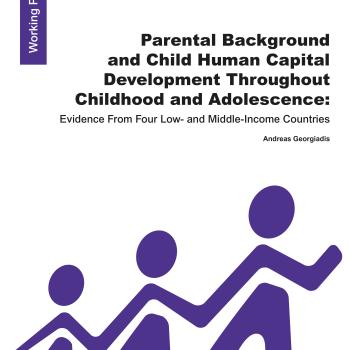Publication Information

Although there is a vast number of empirical studies documenting a strong positive link between parental socioeconomic status (SES) and child outcomes, we do not know whether these associations remain robust when controlling for other parental background dimensions. In this working paper, Andreas Georgiadis investigates the association of child human capital indicators with a wide range of parental background dimensions across four low- and middle-income countries (Ethiopia, India, Peru and Vietnam) and at different stages of childhood and adolescence using data from Young Lives.
The working paper's key finding is that parental income is strongly and positively associated with child nutritional status and cognitive achievement across all countries and at all stages of childhood and adolescence, even after controlling for other background dimensions, but the same does not hold for parental education. Child non-cognitive skills across all countries and at different ages, however, are mostly predicted by mother’s personality traits reflected in her noncognitive skills, social capital, and aspirations for the child’s education.

Although there is a vast number of empirical studies documenting a strong positive link between parental socioeconomic status (SES) and child outcomes, we do not know whether these associations remain robust when controlling for other parental background dimensions. In this working paper, Andreas Georgiadis investigates the association of child human capital indicators with a wide range of parental background dimensions across four low- and middle-income countries (Ethiopia, India, Peru and Vietnam) and at different stages of childhood and adolescence using data from Young Lives.
The working paper's key finding is that parental income is strongly and positively associated with child nutritional status and cognitive achievement across all countries and at all stages of childhood and adolescence, even after controlling for other background dimensions, but the same does not hold for parental education. Child non-cognitive skills across all countries and at different ages, however, are mostly predicted by mother’s personality traits reflected in her noncognitive skills, social capital, and aspirations for the child’s education.

